Call us to place your order +254 721 510369 | +254 736 325749
Memory Boost
- Natural, Supplements
- October 22, 2021
- 0

Memory Boost is a unique formulation that combines the extraordinary properties of herbs like Rosmarinus officinalis (rosemary) and the two most popular health – enhancing varieties of Camellia sinensis (the tea plant): green tea and purple tea, ginkgo biloba and other herbs of proven efficacy to enhance the central nervous system functions and fight mental decline.
Although recommended mainly to enhance memory and cognitive functions, its beneficial action on the overall health of the regular consumer makes it a supplement of choice for a wide range of conditions and as a general adjuvant to prevent a series of degenerative diseases and slow down aging. This is due to the multiple adaptogen properties of its components which we review briefly herein.

Rosemary is a fragrant evergreen shrub with needle-like leaves and a woody aroma native to the Mediterranean. which is best known worldwide as a food seasoning or culinary condiment.
The herb not only tastes good in culinary dishes, such as rosemary chicken and lamb, but it is also a good source of iron, calcium, and vitamin B-6. It is typically prepared as a whole dried herb or a dried powdered extract, while teas and liquid extracts are made from fresh or dried leaves.
It is likewise one of the most popular medicinal plants that have been used in various traditional medicine systems since time immemorial due to its multiple health benefits. Rosemary has been used to help alleviate muscle pain, reduce joint inflammation and give pain relief. Preliminary studies support its pain relief benefits and suggest that it may be more effective than acetaminophen.

Rosemary is known for its positive action on the central nervous system, and to prevent brain aging. Rosemary appears to be protective against brain damage and might improve recovery from strokes.
Most importantly, rosemary is known for its positive action on the central nervous system, and to prevent brain aging. Rosemary appears to be protective against brain damage and might improve recovery from strokes.
Indeed, a few small studies suggest that rosemary may improve attention and concentration, alertness, energy and mood, reduce mental fatigue, boost the immune and circulatory system and ease stress. Additionally some research points to the promise of rosemary’s therapeutic ability for prevention of Azheimer and general brain aging.
Laboratory studies have shown rosemary to be rich in antioxidants, and anti-inflammatory compounds which play an important role in neutralizing harmful particles called free radicals, help boost the immune system and improve blood circulation.
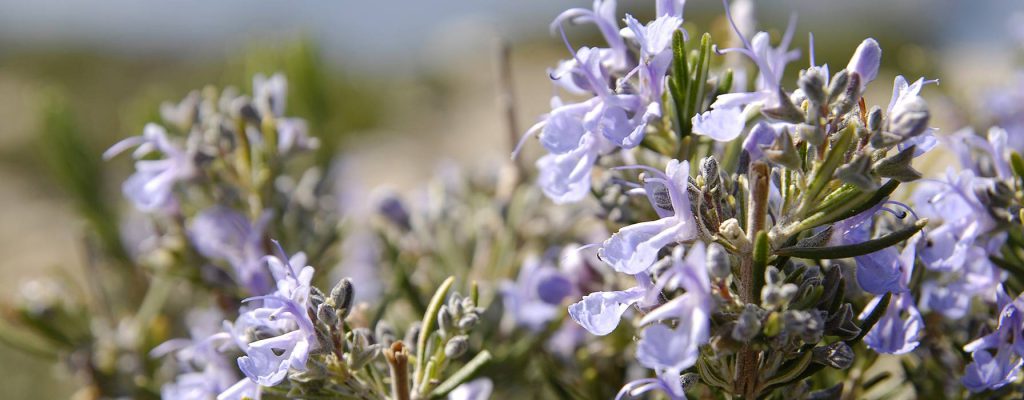
Scientists have found that rosemary’s major component, carnosic acid, can fight off damage by free radicals in the brain as well as macular degeneration, a most common eye disease affecting elderly people. A study published in the journal Investigative Ophthalmology & Visual Science, led by Dr. Stuart A. Lipton, Ph.D. and colleagues at Sanford-Burnham Medical Research Institute, revealed that carnosic acid can significantly promote eye health, particularly in age-related diseases affecting the outer retina.

Applied topically, rosemary even promotes hair growth, which is the reason why it is included in some shampoo formulations.
Further research in humans is required as well to confirm other beneficial properties ,some of which have been observed in animal studies, such as:
- Cancer: Rosemary has antioxidant and anti-inflammatory effects, which test-tube studies suggest may fight cancer cells.
Research published in Oncology Reports found that “crude ethanolic rosemary extract (RO)” slowed the spread of human leukemia and breast carcinoma cells.”
Another study, published in Bioscience, Biotechnology and Biochemistry, concluded that rosemary might be useful as an anti-inflammatory and anti-tumor agent.
Also, a report published in the Journal of Food Science revealed that adding rosemary to ground beef reduces the formation of cancer-causing agents that can develop during cooking.
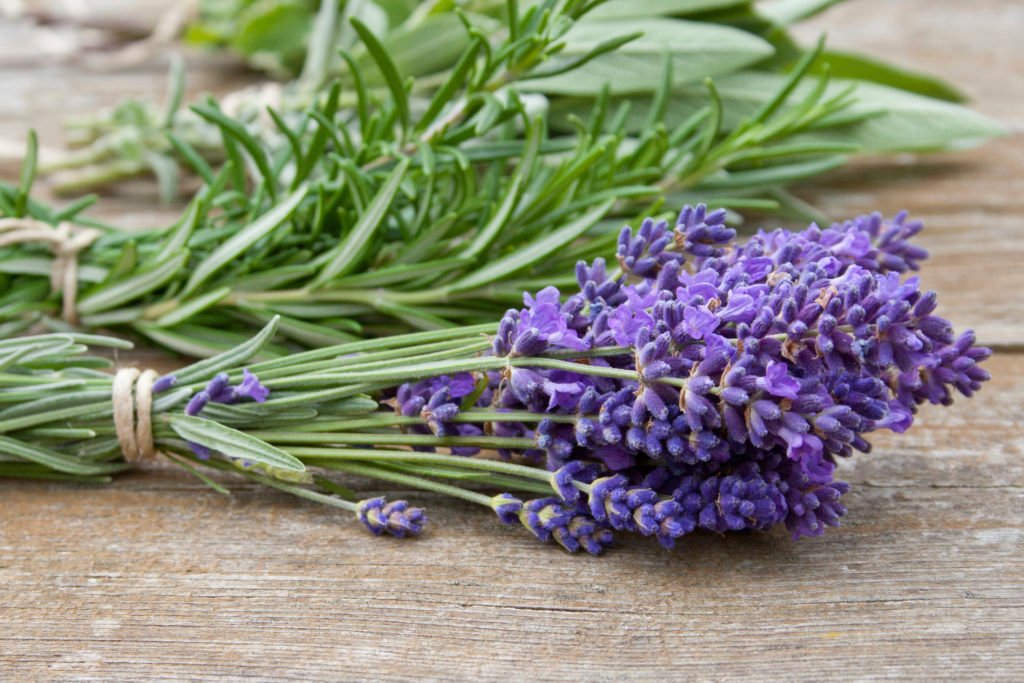
Rosemary has antioxidant and anti-inflammatory effects, which test-tube studies suggest may fight cancer cells.
Finally, according Dr. Mohammad Shahadat Hossan, University of Nottingham, the three active ingredients that rosemary tea possesses , i.e. rosmarinic acid, caffeic acid, and carnosol, act together as an anticancer agent , particularly to prevent colon cancer.
- Liver and digestive health: Animal studies indicate that rosemary may stimulate the release of bile, which is important in fat digestion, and activate your own antioxidant defense mechanisms to protect your liver.These conclusions confirm the long-standing traditional use as a digestive aid. Currently rosemary tea and tinctures have been approved in Germany to be prescribed by mainstream medicine to help with digestive ailments.
- Food poisoning: Rosemary can help inhibit the growth of certain strains of bacteria that cause food poisoning.
- Antibiotic side effects: Rosemary may increase the effectiveness of certain antibiotics. This may allow for a lower dose of these drugs, which could reduce side effects.
- Antibiotic resistance: Rosemary may weaken the cell walls of antibiotic-resistant bacteria — not only damaging them but also enabling antibiotics to enter.
CAUTION: It’s generally advised to avoid rosemary if you’re pregnant , as it can be an abortifacient, a product that could stimulate a miscarriage. Neither should rosemary be consumed in cases of epilepsy or high blood pressure.
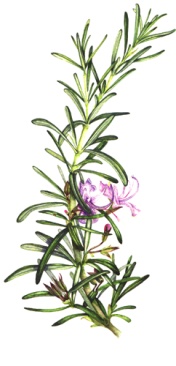
Antibiotic side effects: Rosemary may increase the effectiveness of certain antibiotics. This may allow for a lower dose of these drugs, which could reduce side effects.
DRUG INTERACTIONS : Rosemary can affect the activity of some medications, including:
- Anticoagulant drugs: These include blood-thinning medications, such as Warfarin, Aspirin, and Clopidogrel.
- ACE inhibitors: These are used for treating high blood pressure. They include lisinopril (Zestril), fosinopril (Monopril), captopril (Capoten), and enalapril (Vasotec).
- Diuretics: These increase the passing of urine and include hydrochlorothiazide and furosemide (Lasix).
- Lithium: This is used to treat the manic episodes of manic depression. Rosemary can act as a diuretic and cause lithium to reach toxic levels in the body.
Green and Purple Tea
Both green tea and purple tea are brewed from the dried leaves of the tea plant, just like regular black tea. In the case of green tea versus black tea, it is the level of oxidation of the leaves that determines the type of tea obtained as final product.
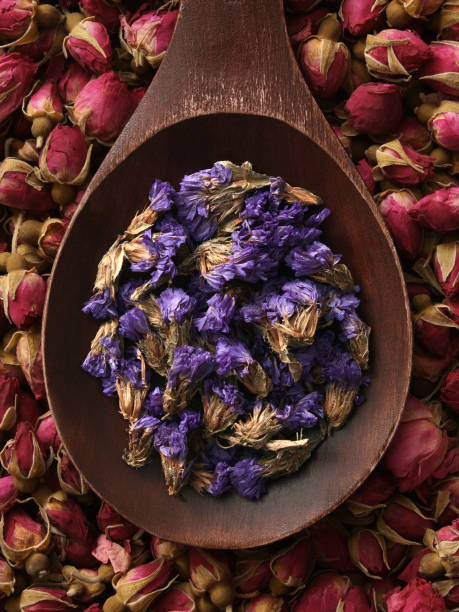
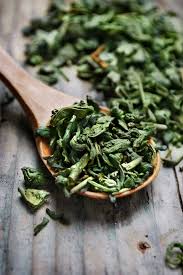
Green tea is made from unoxidized leaves and is one of the least processed types of tea. It therefore contains more antioxidants and beneficial polyphenols than regular black tea.
Purple tea, on the other hand, is a cultivar of Camellia Sinensis , Assamica varietal, whereby a genetic mutation in the plants causes the leaves to turn the drink purple. This colour is due to their high contents of anthocyanins , composed of many phytochemicals, which exhibit remarkable health benefits when we consume them. Anthocyanins are likewise found in the so-called “superfoods”. like Acai berries, pomegranates and blueberries.
Purple tea cultivar is grown at high altitudes near the Equator (elevations between 4.500 and 7.500 feet). This elevation results in higher levels of UV bombardment and causes the plants to produce large quantities of anti-oxidants to protect the leaves from damage. As a result , purple tea’s contents of anthocyanins is higher than in green and black tea. Anthocyanins are particularly known to be beneficial against cardiovascular diseases.
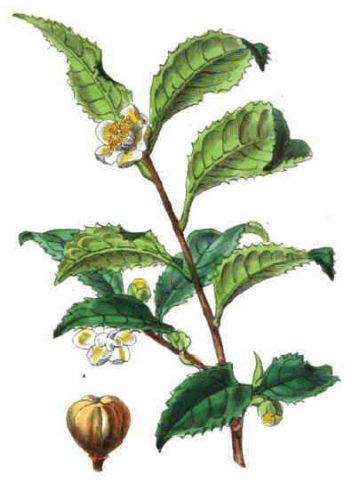
Purple tea also contains higher amounts of another anti-oxidant – polyphenols. More than black or most green teas (16.5 percent versus 10.1 percent for black and 9.1 for green).
Like green tea, purple tea also has high levels of catechins, especially EGCG which is the powerful anti-oxidant found in green tea. These neuro-protective antioxidants permeate the blood brain barrier, and in a study performed on mice, significantly boosted brain antioxidant capacity.
These anti-oxidants are known to provide anti-cancer benefits, improve vision, and aid in cholesterol and blood sugar metabolism. At the same time, caffeine content is lower than that of green and black tea.
And that is not all. There is another secret weapon in the purple tea arsenal, which is not found in any other tea or food. It’s a special type of polyphenol called GHG. Initial research has shown that it can decrease fat mass & thickness while increasing lean body mass. Researchers think this is caused by GHG affecting lipase, the enzyme that breaks down fats so the body can easily digest them. Purple tea is therefore advised to help in weight loss.

Other ingredients in MEMORY BOOST include ginkgo biloba and various well-known herbs which enhance brain function and help to protect our central nervous system from free radicals and the ravages of age.
Ginkgo biloba improves blood flow to the brain and acts as an antioxidant. It reduces symptoms of psychiatric disorders and dementia,generally improving brain function and well-being. It further reduces anxiety and is used to treat depression.
Additionally according to some studies, it can help fight inflammation, improves general circulation and heart health.
It has also been found that it can support vision and eye health.

How to prepare MEMORY BOOST for maximum effect :
Like other herbal infusions, it is simple to make and can be enjoyed either as a warm beverage or a cold one to beat the scorching summer heat.
To make 4 cups of tea: Pour a little more than 4 cups of cold water into a kettle. Add 5 grs. of MEMORY BOOST (about 2 heaping tablespoons). Heat and let it simmer for 3 to 4 minutes. For a stronger concoction, you can let it boil for 5 to 7 minutes.
Leaving it on the stove will not turn it bitter like other teas.
You may enjoy it hot, or , for a refreshment you may add some crushed ice to it. Sweeten to taste, with stevia or honey , although its pleasant taste and aroma allows to do without any such addition.
You may keep it in the fridge, ready as a thirst quencher, adding lemon juice, cinnamon, ground cloves or any other spice or herb of your choice.
Presentation
Our ‘MEMORY BOOST”TEA comes in 250 gr., 500 gr. and 1 kg. packet.
For further information on the components of MEMORY BOOST go to:
https://www.youtube.com/watch?v=lah7yv46Et8
https://www.bestsourcenutrition.com/blogs/news/top-10-benefits-of-rosemary-tea
https://www.miastylespace.com/blog/rosemary-tea-and-its-health-benefits
https://www.youtube.com/watch?v=otxM65Fy_Ec
https://www.youtube.com/watch?v=M5RVJY3ZCI4
https://www.youtube.com/watch?v=t4Gcrc9lMog
https://www.youtube.com/watch?v=xn5rRh6WedM
https://www.youtube.com/watch?v=wyQGUoYY3lY
https://www.youtube.com/watch?v=B4o1_quUTfE
Disclaimer
This content is strictly the opinion of its author and is meant for informational and educational purposes only. It is not intended to provide medical advice or to take the place of medical advice , diagnosis or treatment from a personal physician.
Readers of this content are advised to consult their doctors or qualified health professionals regarding specific health questions. Neither the author nor publisher of this content takes responsibility for possible health consequences of any person or persons reading or following the information in this educational content.
All readers of this content, especially those taking prescription or over-the-counter medications, should consult their physicians before beginning any nutrition or supplement or lifestyle programme.



